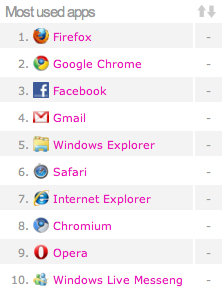It’s the year 1936. The first freely programmable computer — the Z1 — is being produced. With the ability to run programs from punched tape, the idea of desktop applications is forever solidified. This is now the stepping stone for all future computing, and nothing in the foreseeable future can stop it.
Until now.
It wasn’t too long ago when downloading applications for various operating systems was a daily occurrence for me (as was reinstalling operating systems to rid them of those applications). So imagine my surprise when I realized that I had not downloaded a Mac, Windows, or Linux application in over half a year! Not only is it interesting, but it is shocking as well, particularly when considering it has, for many years, been my job to review them.
How is this possible?
After all, these applications have for the longest time been necessary to exploit our computer’s full potential. If we want to create documents, we have Microsoft Office; if we want to edit photos, we have Photoshop; if we want to play games, we have StarCraft II; and if we want to do anything else on our desktop, there’s an app for that (yes, I had to say it).
Yet those days are fading fast. It is inevitable.
The Most Used Apps are Browser-Based
Take a look at application usage stats from Wakoopa, a service that tracks application usage on user’s computers who opt in. Of the top ten listed, eight of those are Web-oriented programs. Windows Explorer and Microsoft Messenger are the other two. Windows Explorer, at least in my mind, doesn’t really qualify as a desktop application in this context. Microsoft Messenger, though, is fair game. Sure, these stats alone are not much as far as hard evidence is concerned, but common sense should prevail. Desktop applications are dying.
There are suitable Web-based replacements for most, if not all, desktop-based applications. If you want to create, edit, and share documents, there is Google Docs. If you want to edit photos, there is Picnik. If you want to be unproductive, there is Farmville. If you want to watch videos, there is Hulu and YouTube. The list goes on and on.
We now live in a society where constraints are regularly avoided by consumers. Where openness and mobility are king. We want software to work with us when we want it, where we want it, and how we want it. As disheartening as it might be, the desktop operating system is no longer the best solution.
New and existing platforms have been engineered to pick up where the desktop left off. The Web has advanced significantly with major developments in Flash, HTML5, WebGL, JavaScript, and other technologies. Eventually, we will be playing beautiful 3D-intensive games in the comfort of our own Web browser. Smart phones and tablets are also on the rise. Arguably, these devices will continue to experience amazing growth as the world as wireless access continues to improve. And then there are those application markets.
Eventually, I believe these application markets will become the platform itself, with hardware acting primarily as an interface to the this content. Think about it: we already have the iPhone, iPod, iPad, and iTV taking advantage of a single, unified platform, iTunes. A social network is even being built around into it. It’s only a matter of time before most of Apple’s remaining products, including Mac computers, follow suit.
Yet we still have the traditional desktop with the traditional operating system that is designed to run third-party software. Admittedly, it is still useful today. There will always be the professionals and hardcore geeks that prefer today’s way of acquiring, developing, and running applications. There is a level of customization and control that is always going to be desired by certain consumers and businesses.
Everyone else, however, won’t miss these old desktop applications. Just as I had forgotten about desktop applications, the rest of the world will, in time, move on. But until someone cuts the cord, it’ll be painful to watch.





None of these apps are work related productivity apps. web based productivity apps are shit. VDI is a more likely scenario for professionals.
That’s a bold claim to make with no data to back it up…
I would say its the other way around. I think desktop apps have never been more essential. The reason being the popular web services. There are no more websites… the web site is now just a view into the web service. Desktop apps and mobile apps are flying off the server faster than ever.
But, thats just what I see going on from my angle. Yours may be different.
Actually, the most used apps are browsers. You know…desktop top apps.
“there’s an app for that (yes, I had to say it).”
No. You didn’t. Well I suppose if a single source that isn’t a representative sample of the computing population is your only basis for this entire article—kudos, you nailed it—the desktop is dead. But maybe if you left your couch and laptop and joined the real world of people that do WORK, you’d see your opinion doesn’t hold much weight or validity.
Sorry but this is BS 90% of the applications I use never be used like this. My colleagues would laugh at me if I said I was using web based apps.
I don’t see desktop apps really going away as long as they offer a superior experience over the online version. Certain types of apps like email and news readers are great as online-only applications. Word processing and such is possible online but the experience is not quite there yet. But other types of apps like audio/video editing I think will remain on the desktop for a long time.
It’s funny because in my younger days we all worked on dumb terminals and there was a central server on campus. Everything was text-only then too, but it was exactly as you describe. Basically the terminals were merely a browser and all the apps existed on the server.
This article may have been relevant 5 years ago. Now it’s just obvious. And wildly inaccurate in parts.
I couldn’t agree more with Martin D. This article is 5-10 years too late.
Web-based apps aren’t mature enough for the enterprise yet. However, that is not to say that in the future, companies will see a benefit to moving to strong web-based apps as they mature.
But several things have to happen first.
Sure, I can go out and build an eyeOS server and deploy it in my enterprise. But it’s not perfect. Google’s offerings are ok, but I think most companies would prefer to host the apps on their own servers in their own secure environment within their own control.
Conversely, mobile computing is growing. Companies like the idea that their employees can continue to work where ever they are. But you don’t want them limited to internet connectivity. I mean, if they need to finish up a report and their home internet is down, or they’re in flight, or just simply don’t have internet connectivity for whatever reason, you still want them to be productive.
So, desktop apps on a mobile platform are a must.
I am never going to put all my files “in the cloud”. I like services like Dropbox, then they are in the cloud, but also on all my machines. I don’t think people will ever get rid of local applications. It doesn’t make any sense. ISP’s have already tried going tiered and getting rid of unlimited use, can you imagine how much bandwidth you would use if all your applications were web based? Remember when the iPhone came out and they only have the web sdk?? That didn’t fly very well. AT&T and Verizon have already dropped their unlimited wireless plans. I am never going to make myself more dependent on them for things I can do locally with my files. I don’t see why anyone would.
this article is retarded.. serious production apps .. i.e. adobe cs5, audio, etc, and development apps that make the web possible.. are always going to be on desktops.. so quit dreaming author. though the next generation html 5 stuff not to mention flash and java developments lately indicate you might eventually be right but we’re far from there.
Even with (very awesome) things like Unity, I don’t see a desktop application death any time soon.
Yes, cloud computing is awesome, and yes, most of the time we’re able to have internet. But we humans like to own things. You think the DRM in Starcraft 2 (or AC2 or any of the billion other hot buttons) is bad, wait until you don’t even have access to *your own* files.
What’s that? You didn’t pay last month? Oh, sorry, we own all your stuff so….. gfg. What’s that? You break our Terms of Service? Well, you know that project you’ve worked 60 hours on? You can’t get it anymore. Sorry, you checked that little box. Bye bye!
he first few times someone regurgitates an article concept, it’s funny. But this is just getting painfully tired now.
Article writer needs to tour some places where people do real content creation work, to understand why the desktop will be our friend for a while to come still.
Sorry but this is BS. 90% of the applications I use could never be used like this. My colleagues would laugh at me if I said I was using web based apps.
Software as a service in this economy? So you think people will trust companies to still be in existance after spending money on SAAS? If I buy a desktop productivity application and the manufacturer closes its doors, I can still run the app on my company’s computers as long as I want or at least until the hardware becomes so antiquated as not to be of use anymore. With SAAS, the day the application manufacturer closes its doors all my producitivity stops and I am out of all that money. SAAS is a sales pitch dreamed up by greedy executives as a reason to no longer spend money on Supply Chain Management. And no that won’t lower the price of the app either. In the real world, the only reason I have ever seen management lower the price of apps was because of an actual or anticipated loss of market share.